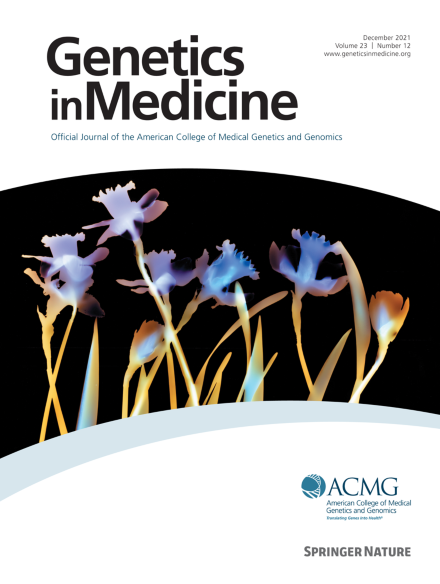Long-term management strategies for pegvaliase use in phenylketonuria: Lessons learned from the phase-3 PRISM open-label extension study
IF 6.2
1区 医学
Q1 GENETICS & HEREDITY
引用次数: 0
Abstract
Purpose
Pegvaliase is an enzyme substitution therapy for phenylketonuria, an autosomal recessive disorder of amino acid metabolism resulting in phenylalanine (Phe) accumulation, intellectual disability, and behavioral/psychiatric disorders. The phase-3 PRISM trials (NCT01819727, NCT01889862, and NCT03694353) established pegvaliase efficacy in reducing blood Phe, but its pharmacokinetics differs between individuals, resulting in varying times to achieve clinically meaningful blood Phe targets.
Methods
Using participant-level data from PRISM, we developed a pharmacokinetic/pharmacodynamic model that explains individual-level blood Phe patterns as a function of pegvaliase clearance during the maintenance phase.
Results
As pegvaliase exposure induces immune tolerization, drug clearance declines. A period of high sensitivity of blood Phe to dietary Phe intake and pegvaliase exposure is observed at ∼120 to 200 μmol/L Phe, reflected in increased blood Phe volatility. This model suggests that this volatility represents impending, but incomplete, tolerization and that reducing pegvaliase dose or liberalizing dietary Phe intake at or before this stage is premature and can result in marked blood Phe increases. With continued exposure, pegvaliase clearance continues to decline, and dietary Phe intake and blood Phe become uncoupled.
Conclusion
These analyses establish how tolerization presents clinically and suggest a staged therapeutic approach: (1) tolerance induction, (2) diet liberalization, and (3) gradual dose adjustment.

苯丙酮尿患者使用pegvaliase的长期管理策略:从PRISM开放标签扩展研究中获得的经验教训
目的:Pegvaliase是一种用于苯丙酮尿的酶替代疗法,苯丙酮尿是一种常染色体隐性氨基酸代谢疾病,导致苯丙氨酸(Phe)积累,智力残疾和行为/精神障碍。3期PRISM试验(NCT01819727, NCT01889862, NCT03694353)证实pegvaliase在降低血液Phe方面的有效性,但其药代动力学在个体之间存在差异,导致达到临床有意义的血液Phe目标所需的时间不同。方法:利用PRISM的参与者水平数据,我们建立了一个药代动力学/药效学模型,解释了维持阶段个体水平血液Phe模式作为pegvaliase清除率的函数。结果:由于pegvaliase暴露诱导免疫耐受,药物清除率下降。在约120-200 μmol/L Phe时,血液Phe对膳食Phe摄入和pegvaliase暴露有一段时间的高敏感性,反映在血液Phe挥发性增加。该模型表明,这种挥发性代表了即将到来的,但不完全的耐受性,并且在此阶段或之前减少pegvaliase剂量或放开饮食中Phe的摄入是过早的,并可能导致血液中Phe的显著增加。随着持续暴露,pegvaliase清除率继续下降,膳食Phe摄入量和血液Phe变得不耦合。结论:这些分析确定了耐受性的临床表现,并建议分阶段治疗方法:(1)诱导耐受性;(2)饮食自由化;(3)逐步调整剂量。
本文章由计算机程序翻译,如有差异,请以英文原文为准。
求助全文
约1分钟内获得全文
求助全文
来源期刊

Genetics in Medicine
医学-遗传学
CiteScore
15.20
自引率
6.80%
发文量
857
审稿时长
1.3 weeks
期刊介绍:
Genetics in Medicine (GIM) is the official journal of the American College of Medical Genetics and Genomics. The journal''s mission is to enhance the knowledge, understanding, and practice of medical genetics and genomics through publications in clinical and laboratory genetics and genomics, including ethical, legal, and social issues as well as public health.
GIM encourages research that combats racism, includes diverse populations and is written by authors from diverse and underrepresented backgrounds.
 求助内容:
求助内容: 应助结果提醒方式:
应助结果提醒方式:


